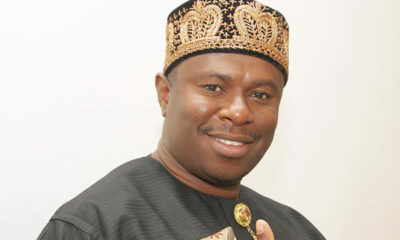News
The dying public school
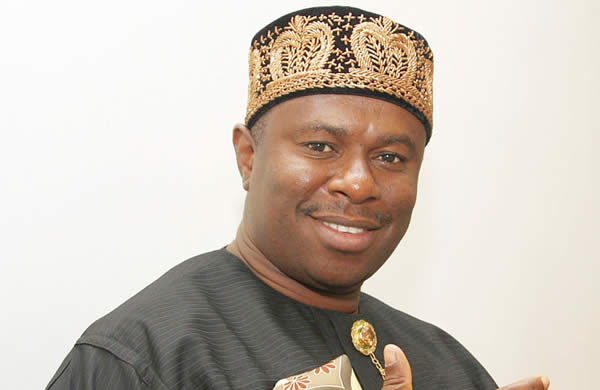
By Dakuku Peterside
There has been no remarkable uproar on the public-school collapse in Nigeria, affecting primary, secondary, and university education. Our leaders do not view it as a crisis. The reason is evident: there is a widespread trend among the garrulous upper class and middle class to send their wards and children to pricey private schools in Nigeria, with most of them sending their kids abroad. This dislocation between the elite class and public schools means that they are not only unmoved by its decay, but sometimes they are not even aware of the extent of the problem.
Increasingly, public school is becoming the domain of low-income people who need more resources to send their children to good private schools. Good education is no longer affordable and is a class issue in Nigeria today. The paradox is that today’s elite and middle class are products of a robust public school system that existed between the 1930s and 1990s in Nigeria. During these golden years of public school in Nigeria, it provided an environment that allowed individuals of different socioeconomic backgrounds to interact with one another while removing barriers based on race, class, and religion. These schools also provided young Nigerians with the life skills they need to be self-sufficient and productive, and many of the products of this public school system became global giants and are still making waves worldwide and nationally in various fields of human endeavour. Quality public education has been steadily declining, particularly since the 1980s, which has led to the nearly total collapse of the system we have in place today. There has been a discernible drop in our public school system’s overall level of instruction since the 2000s, which has alarmed the populace.
Nigeria has faced numerous challenges in providing quality public education for all its citizens. Economic downturns, political instability, corruption, and conflicts harm the education sector. Over the years, various education policies and reforms have been implemented to address the sector’s challenges. These include the Universal Basic Education (UBE) programme, which provides free and compulsory education for all children up to junior secondary school level, and efforts to promote technical and vocational education to address skills gaps. Despite these efforts, significant disparities in access to quality education persist. The failure of public education in Nigeria has been a longstanding issue, marked by various challenges and setbacks that have hindered the system’s ability to provide quality education.
These challenges include chronic underfunding of the public education sector, a significant issue in Nigeria. We know that government spending on education has varied over the years, but it has often fallen short of recommended benchmarks such as the UNESCO-recommended 15-20% of the national budget. This lack of funding has resulted in inadequate infrastructure and a shortage of qualified teachers and essential educational resources. Second, there is a lack or insufficiency of essential infrastructure, including classrooms, libraries, labs, and restrooms in public schools. Dilapidated buildings, overcrowded classrooms, and unconducive learning environment make it difficult for students to learn effectively and for teachers to deliver quality instruction. Third, the quality of teaching in public schools is often compromised due to factors such as inadequate teacher training, low motivation, miserable wage , and poor working conditions. Fourth, the curriculum used in public schools is only sometimes relevant to the needs of students or the demands of the modern world. It may lack emphasis on critical thinking, problem-solving, and practical skills essential for success today. Fifth, the disparities in access to education persist in Nigeria, with rural and marginalised communities often having limited access to quality schools and educational resources. Sixth, corruption and mismanagement within the education sector are our albatross. Funds earmarked for education may be misappropriated or embezzled, leading to a lack of accountability and transparency in the use of resources. It is little wonder that many state governments claim to make public education the centrepiece of their administration’s targets, yet little or no improvement is seen.
Addressing these issues requires concerted efforts from the government, civil society, the private sector, and international partners. But it also requires the active participation and support of each one of us. Priority should be given to increasing investment in education, improving teacher training and welfare, upgrading infrastructure, revising the curriculum to be more relevant and inclusive, and promoting access to education for all, especially marginalised groups. Additionally, efforts to tackle corruption and promote good governance are essential for building a more effective and sustainable public education system in Nigeria. Ironically, governments at both federal and state levels have paid lip service to public education over the years, leading to the rise of the private education sector to fill the gap. Although millions of children with no other option still receive their education in public schools, they are no longer the place teachers and students fervently desire to be. The clamour for private schools has led to the exponential rise in Nigeria’s private primary, secondary and tertiary schools. We, as citizens, as parents, as educators, as policymakers, have a role to play in reversing this trend and revitalizing our public education system. A cursory look at statistics will show any keen observer that we are in a dangerous place with our future generation, most of whom will not get any meaningful education. We are cheaply mortgaging the future by continuing to underinvest in public schools. All we are doing is laying the groundwork for society to fail. It is not appropriate to do so. For instance, from 2018 to 2020, enrolment in primary school declined by 62,000 or 0.3% (from 22,384,755 to 22,322,234) in public schools but increased by about 82,000 or 1.51% (5,504,632 to 5,587,528) in private schools. Likewise, enrolment in public secondary schools increased by about 18% between 2016 and 2019, while in private secondary schools the increase is about 56%. Besides, the student-to-teacher ratio in public primary schools is about 1:49 (against the 1:35 recommended, while it is significantly lower, at about 1:30, in private primary schools. Relatively, more private schools are popping up in big cities than public schools, and the numbers are almost getting even in some cities. This trend is expected to continue this way unless there is a significant intervention to stop the decline in public school enrolment, especially in urban areas with substantial upper- and middle-class families. The urgency of the situation cannot be overstated. We must act now to save our public education system.
The problem with private education often is the cost. Quality education costs are so high that only a few Nigerians can afford it. Recently, some Nigerians were abhorred by the news of the cost of fees of British Charterhouse School (N43 million per annum) for its students. Most did not know that the school had a waiting list of over 1000 when it initially wanted only about 200 pupils. Other decent private schools cost millions of Naira yearly, and parents struggle to cover these costs. Ironically, private schools are not only about quality of education but also about class distinction. It is assumed that the more expensive the school is, the better the quality. Unfortunately, the current situation is a shift of emphasis to expensive private primary, secondary and tertiary education at the expense of public institutions. The solution lies in a conscious public sector policy revision that encourages a renewal of the public education sector through curriculum renewal, teacher retraining, infrastructure renewal and renovation. For instance, when former Governor Rotimi Amaechi of Rivers State revamped and modernised public schools with up-to-date modern facilities, parents began to return their wards to public schools that had become competitive with even the best private schools. Most recently I got involved in helping two state governments assess the state of education and I just wept but I could feel the seriousness and determination of the affected governors to fix the broken system.
I applaud the president’s plan to census the Nigerian school system to create the primary data for education planning and development. I sincerely hope that the federal and state governments give serious attention to our public education sector. No template exists in the world where a country develops its human resources through private education. All the developed countries we know of developed and sustained a robust quality public education system that is inclusive, equitable, and of high standards. Public schools in these countries are where the children of the rich, the poor, and even the migrants interact and learn in a melting pot of family, cultural, and racial diversity. Quality primary education is a fundamental right of every Nigerian child, and the government at all levels must be held accountable for failure to provide that. Today’s children live in a highly technological and scientific globalised world, and they compete locally and globally for survival and contribute to humanity. It is a disservice to them if they lack the basic literacy, numeracy, and creative skills they need to thrive and develop in Nigeria.
News
Student loan to start with federal institutions — FG
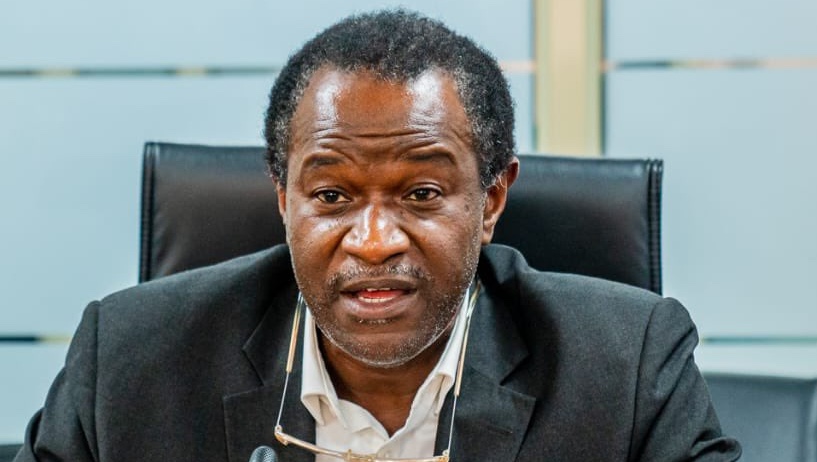

The Federal Government says the student loan scheme would be rolled out in phases, beginning with the federal institutions.
The Managing Director, Nigerian Education Loan Fund, Akintunde Swayerr, who made this disclosure in an interview newsmen on Friday, said the student loan application portal will be opened on the 24th of May for loan applications.
He further said the government is currently “in the midst of a sensitization campaign to inform Nigerians how the scheme will work.”
Swayerr explained that the loan scheme seeks to bridge the financing gap for students in Nigeria, enabling them to become more resourceful, and eventually aiding the country.
“On the 3rd of April 2024, President Bola Ahmed Tinubu signed into law a monumental act that seeks to bridge the financing gap for applicants who want to get a higher education that is tertiary level.
“…and who wants to get vocational training to get proper qualifications that enables them to be more marketable and useful to the Nigerian society.
“The fund covers 100 percent of all the fees of tertiary institutions. There’s also upkeep for the student,” he said.
Swayerr noted that this plan will be rolled out in schemes, the first being the public institutions because of the large number of students in that sector requiring financial aid.
“We’re going to roll this plan out in phases. The first phase will be with federal institutions then to others. It’s going to be the public sector at the beginning because that’s where we find the bulk of students who perhaps need the financing cover and are most vulnerable.
“We have a system that hopefully makes this have a national spread and some degree of equal opportunities for those who have the desire, capacity, eligibility to engage in this scheme,” he said.
News
Makinde to recruit 7,000 teachers, 100 caregivers
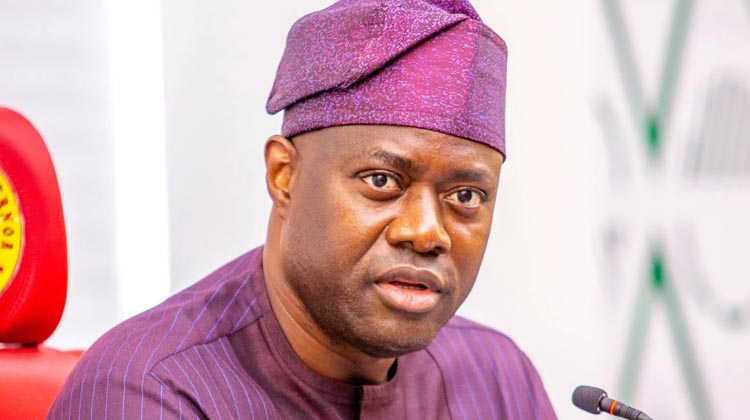

Oyo State Government is set to recruit 7,000 teachers for public primary schools across the state.
The state government also revealed plans to recruit 100 caregivers for special schools across the state.
This was disclosed by the executive chairman of Oyo State Universal Basic Education Board, Nureni Adeniran, during a press conference held at the Board Room on Friday.
He added that for the 7,000 fresh teachers to be engaged by the government, at least 75 per cent deficit of the gap will be plugged.
Adeniran said, “For so many months or years back, there has been a clamour for recruitment of teachers into public primary school, and as an agency, under whose purview we have these primary schools, a lot of requests, a lot of questions have been asked of us, and we have been saying, we are going to do it.
“Ahead of the last general election, a lot of questions were asked about this recruitment, and His Excellency, the governor of Oyo State, Engr. Seyi Makinde did promise that we are indeed going to recruit.
“So it is my pleasure to announce to the world that His Excellency Engr. Seyi Makinde, in fulfilment of his electoral promise, and response to the yearnings of the good people of Oyo State, occasioned by the dearth of teachers in our public primary schools, has graciously approved the recruitment of 7,000 teachers in our public primary schools.
Adeniran said efforts were ongoing to recruit the teachers in fulfilment of the state governor, Seyi Makinde’s promise to bridge the teachers’ deficit in the system.
“In addition, he also approved the recruitment of 100 caregivers in our special schools in the state. This recruitment, the process of which will commence very soon, needs to be brought into the hearing of the good people of Oyo State, especially the intending applicants, and this press conference becomes imperative because of various information that has dominated the media space in the last couple of months, or even years, wherein some scammers would go online and say, Oyo SUBEB is recruiting.
“I can say that we have denied that several times, over and over and over again, and your guess is as good as mine. Those who could do that, even when the approval has not been given, now knowing that the approval has been given, want to utilize the opportunity to scam the unsuspecting members of the public who are intending applicants for this particular exercise.
“So, I am coming out on behalf of the Oyo State Universal Basic Education Board to say that the approval has been given and we are already commencing the preliminary work on the stages of this recruitment exercise, which will also be made public at the appropriate time.”
He, however, warned the public against scammers, saying the government has not appointed any agent or agency to carry out the recruitment process but will make information available to the members of the public as soon as the recruitment begins.
“The essence of this press conference is to warn the unsuspecting intending applicants to be wary of scammers and to let them know that in the process of this recruitment exercise, the details of which will be brought out later, Oyo State government and Oyo SUBEB is not appointing anybody to serve as agents in this recruitment exercise.”
He added that applicants will be selected based on qualifications.
“Therefore, whatever the stages that will be followed to get this exercise conducted in a free, fair, and credible manner, will be emanating from this office under the signature of the Executive Chairman of the Oyo State Universal Basic Education Board.
“We also want to let the people know that if there is anything, even after we might have brought out the template on the stages or the procedures to be followed if there is anything or information required, people should not hesitate to come into the SUBEB headquarters to come and find out by themselves, and not rely on a second-hand or already midwife information that may not be true.
“I also want to say that no person has been empowered to collect a dime from anybody on account of this recruitment exercise. No person, whether staff or non-staff members, has been empowered to collect a dime from anybody on account of this recruitment. We want to use this opportunity to thank His Excellency, Engr. Seyi Makinde for living up to his words as he promised that this recruitment would be done, and he has thus fulfilled that particular promise.
He noted that the public would be notified of the application term, saying, “I want to say that at the next stage of the recruitment, we’ll let the world know how we want to go about it in terms of how the intending applicant will be able to put in their application, what the requirements needed, and where and when to do what would be made available at the appropriate time.
“But I want to say that every information regarding this particular recruitment exercise will be from us, the Head of Service as well as the Civil Service Commission. So these are the agencies and the MDAs that we will be working together to ensure a seamless process.”
News
ThriveAgric showcases AYuTe project’s impact on empowering 125,000 farmers and youths in northern Nigeria
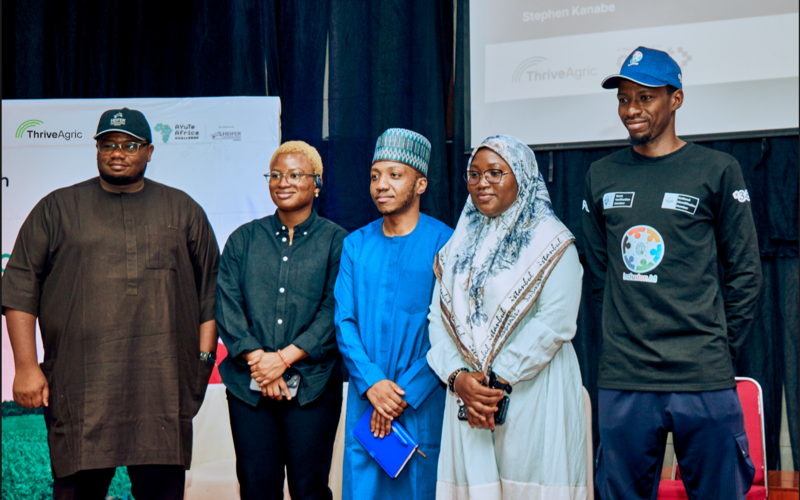

…Joins forces with crust microfinance bank to provide financial inclusion access
ThriveAgric, a leading agricultural technology company, today hosted a project showcase event to celebrate the achievements and future plans of its AYuTe (Agriculture, Youth and Technology) Project. The initiative, launched in collaboration with Heifer International and supported by Crust Microfinance Bank, is empowering 125,000 smallholder farmers with financial inclusion services, creating job opportunities for over 1,000 youths across eight northern Nigerian states including Adamawa, Gombe, Yobe, Jigawa, Kaduna, Kano, Katsina, and Bauchi.
The event, themed “Enabling Financial Inclusion for Smallholder Farmers,” brought together key stakeholders, partners, project beneficiaries, and community members to celebrate the achievements of the AYuTe Project and outline the roadmap for future progress.
The AYuTe Project directly addresses the challenge of financial exclusion faced by many smallholder farmers in Nigeria. By facilitating bank account opening, distributing debit cards, and establishing POS operators in rural communities, ThriveAgric, alongside Crust MFB, is increasing access to formal financial services for these underserved populations. This financial inclusion is a key driver for
improved access to finance, credit, and digital services, ultimately promoting increased productivity and economic empowerment for farmers.
While delivering the keynote address, the Managing Director, Crust MFB, a leading microfinance bank, Stephen Kanabe, emphasized the importance of community, gender inclusion, and agency banking in driving financial inclusion across Nigeria. “We are delighted to support ThriveAgric’s AYuTe Project and contribute financially to these underserved communities,” said Mr. Kanabe.
Commenting on the initiative, the Communications Manager, Heifer International, Chuba Ezeigwe says, “Inadequate access to financial services is a significant barrier for smallholder farmers. We are excited to invest in ThriveAgric’s solutions and contribute to scaling up an agritech innovation that confronts financial inclusion challenges faced by these farmers.”
The event featured presentations, panel discussions, and testimonials from project beneficiaries, including smallholder farmers, Business Service Agents (BSAs), and a Relationship Officer. So far, over 40,000 smallholder farmers now have bank accounts and debit cards and co-operative groups have also been set up through which input financing would be provided to enable further additionality for beneficiaries.
The AYuTe Project represents a significant step forward in ThriveAgric’s mission to build the largest network of profitable farmers in Africa and ensure food security on the continent. The project showcase highlighted the company’s unwavering commitment to empowering smallholder farmers and their communities through financial inclusion and technological innovation.
For additional information or interview requests with a ThriveAgric spokesperson, please contact us via [email protected].
About ThriveAgric:
ThriveAgric is a fast-growing agricultural technology company passionate about ensuring food security. They empower smallholder farmers, leveraging their technology to access finance, and improve productivity & sales to promote food security. ThriveAgric has 450+ warehouses and works with over 500,000 smallholder farmers in Nigeria, Ghana and Kenya. ThriveAgric’s Theory of Change target for 2027 is to provide $500 million in credit to 10 million smallholder farmers and to double the numbers by 2050.
About Heifer International:
Heifer International is on a mission to end hunger and poverty in a sustainable way by supporting and investing alongside local farmers and their communities. They work to end hunger and poverty in partnership with the communities they serve. By supporting and training the world’s farmers, ranchers, and female business owners, they are investing in a new breed of success.
About Crust MFB:
Crust Microfinance Bank (MFB) is focused on purposeful banking. Banking geared towards closing the financial, digital and gender equality gap within communities and between people of different social classes while inviting the public to participate in our purpose. Crust’s message is simple, when your bank with Crust, you are achieving your highest purpose, transforming lives, leaving the world
better than you met it.
-
Finance4 months ago
Court orders Sen. Victor Umeh to repay N136m bank debt to AMCON
-



 Abuja Update3 months ago
Abuja Update3 months agoUNDP, FG partnership needed to achieve inclusion, equity- Minister
-
capital market2 years ago
Rt.briscoe, FBNH, Others halts negative performance of stock market
-
Abuja Update2 months ago
Banks drive stock market performance with N147bn gain
-



 Health1 month ago
Health1 month agoCapacity training will reduce migration of health workers- NPHCDA
-



 Business3 weeks ago
Business3 weeks agoTingo Group unveils Tingo Electric, Tingo Cola drink at Lagos launch
-
Submission Guidelines4 months ago
CALL FOR SUBMISSIONS: POETRY COLUMN-NND
-
News4 months ago
Oil thieves sponsoring malicious media campaign against Navy – Spokesman

